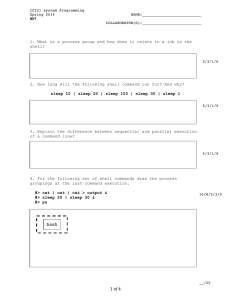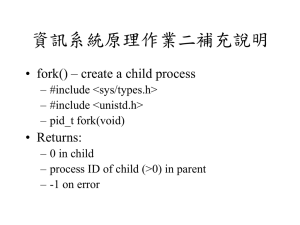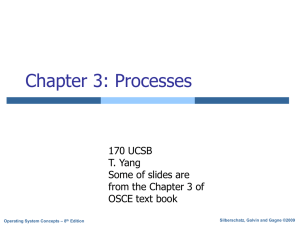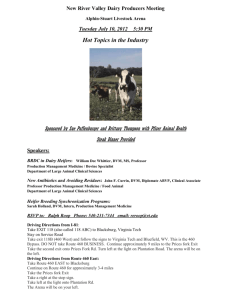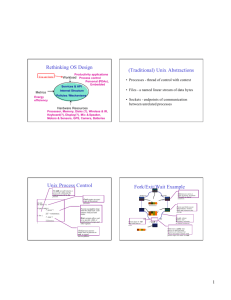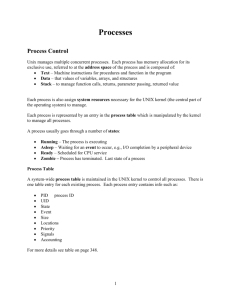Document 11113823
advertisement
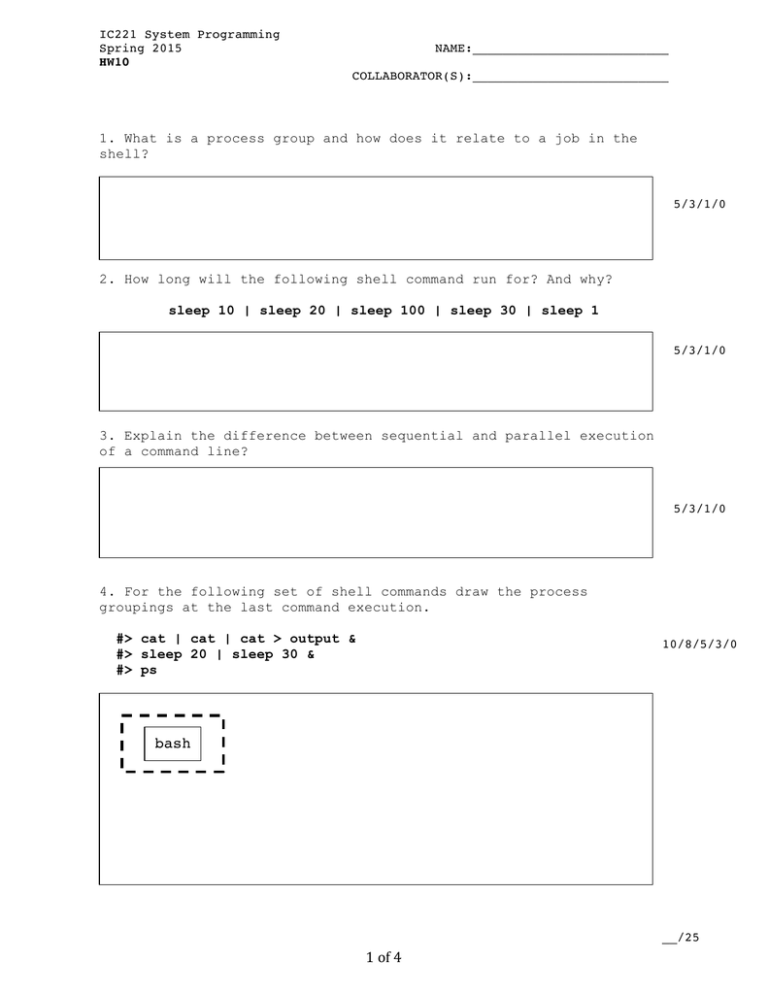
IC221 System Programming
Spring 2015
HW10
NAME:__________________________
COLLABORATOR(S):__________________________ 1. What is a process group and how does it relate to a job in the
shell?
5/3/1/0
2. How long will the following shell command run for? And why?
sleep 10 | sleep 20 | sleep 100 | sleep 30 | sleep 1
5/3/1/0
3. Explain the difference between sequential and parallel execution
of a command line?
5/3/1/0
4. For the following set of shell commands draw the process
groupings at the last command execution.
#> cat | cat | cat > output &
#> sleep 20 | sleep 30 &
#> ps
10/8/5/3/0
bash
__/25
1 of 4 NAME:
NAME: __________________________
__________________________ 5/3/1/0
5. For each of the system calls associated with process groupings,
match them to their description.
setpgrp() _____
(a)
Returns the process group id of
the calling process
setpgid() _____
(b)
Sets the process group id of the
calling process to its pid
getpgrp() _____
(c)
Returns the process group of a
process identified by a pid
getpgid() _____
(d)
Sets the process group of the
process identified by pid to a
specified pgid
6. For each system call, briefly describe the resulting action:
getpgid(0)
setpgid(0,0)
5/3/1/0
setgpid(0,pgid)
setpgid(pid, 0)
7. Consider the following code snippet, what is the output and why? 10/8/5/1/0
int main(){
pid_t cpid;
cpid = fork();
setpgrp();
if(cpid == 0){
if( getpid() == getpgid()){
printf("C: SAME PGID\n");
}
_exit(0);
}else if(cpid > 0){
if(getpgid(cpid) == cpid){
printf("P: SAME PGID\n");
}
wait();
_exit(0);
}
_exit(1); //fork failed_
}
2 of 4 __/20
NAME:
NAME: __________________________
__________________________ 10/8/5/3/0 8. Consider the following code snippet. If we were to run this
program in a terminal, will it be properly terminated by Ctrl-c? If
so, why? If not, why not?
int main(){
pid_t cpid;
cpid = fork();
if( cpid == 0 ){
setpgrp();
while(1);
}else if( cpid > 0 ){
wait();
_exit(0);
}
_exit(1); //fork failed
}
10/8/5/3/0
9. Consider the following code snippet with the open file fight.txt
containing the text _Go_Navy!_Beat_Army! where _ indicates a space.
What is the output of this program, and why?
int main(){
pid_t cpid;
int fd = open( /* fight.txt */);
char buf[1024];
cpid = fork();
if( cpid == 0 ){
read(fd, buf, 10);
_exit(0);
}else if( cpid > 0 ){
wait(); /* wait for child*/
read(fd,buf, 10);
write(1, buf, 10);
_exit(0);
}
_exit(1); //fork failed
}
5/3/1/0
10. The pipe() system call sets the value of two file descriptors in
an array: what is index 0 used for and what is index 1 used for?
5/3/1/0
11. What does it mean to “widow” a pipe? Why must the write end
typically be widowed?
__/30
3 of 4 NAME:
NAME: __________________________
__________________________ 12. What is the default action when a process writes to a pipe more
data than the kernel buffer can hold? Can this default action be
changed?
5/3/1/0
13. If
the open file fight.txt containing the text
10/8/5/3/0 _Go_Navy!_Beat_Army! where _ indicates a space. What is the output
to stdout and what is the output to output.txt, and why?
int main(){
int fd_in = open( /* fight.txt */);
int fd_out = open(/* output.txt */)
char buf[1024]
close(0);
dup2(fd_in,0);
close(1);
dup2(fd_out,1);
while(scanf("%s",buf) != EOF){
printf("%s\n",buf);
}
return 0;
}
14. Add the necessary code using dup2() and close() such that the
child’s write to stdout will be read by the parent through stdin.
10/8/5/3/1/0
int main(){
pid_t cpid;
int pfd[2], n
char gonavy[] = "Go Navy!";
char buffer[1024];
pipe(pfd);
cpid = fork();
if( cpid == 0 ){
write(1, gonavy,strlen(gonavy));
}else if( cpid > 0 ){
__/25
n = read(0, buffer, 1024);
write(1,buffer,n);
}
_exit(1); //fork failed
4 of 4 }
